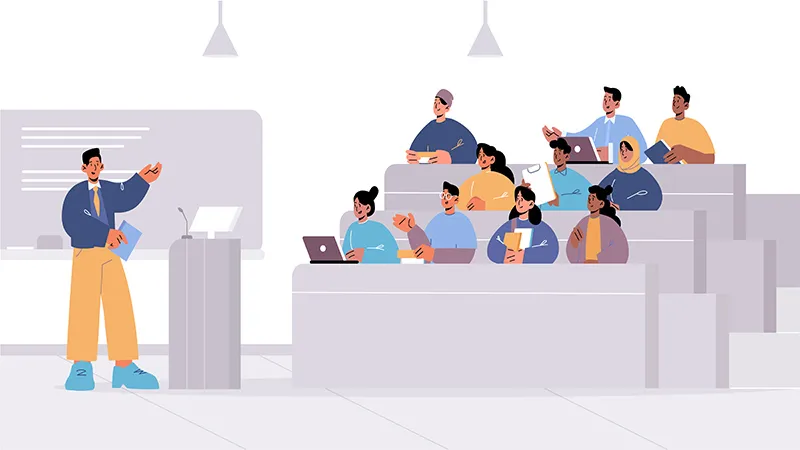Education and Training
Why Do You Want to Be a Teacher? Frequently Asked Interview Questions
Why do you want to be a teacher? When you face an interview for a teaching profession, it’s more than likely that you’ll encounter this question. An answer like “It’s my passion.” won’t always cut it. Instead, you’ll have to employ a bit more finesse into your reply and craft it depending on the organisation hiring you.
So that’s what we’re dealing with in today’s blog. But that’s not the only thing we’ll talk about here. We want to add much more value to the reading time you invest here. Therefore, we’ll talk about common interview questions that would-be teachers face in their interviews.
Let’s get started.
Table of Content
Common Interview Questions and Answers
Let’s start with the most common of the teacher interview questions (whether you teach primary, secondary or university students or a fresher teacher), which is the title of today’s blog.
Why Do You Want to Be a Teacher?
Your potential employer (like primary schools, secondary schools etc.) may not state this question exactly like this. They may change the wording, adding some phrases here and there, but the summary is that they’re asking you why you want to be a teacher.
Variations of this question may include:
- Why are you passionate about teaching?
- Why do you have a passion for teaching?
- What is it that you love about teaching?
- Why are you interested in teaching?
- What is it about the teaching career/teaching job that is motivating you to leave your current job?
So, how do you answer these?
When answering any version of the question “Why do you want to be a teacher?”, you can give them some generic bullet points like this:
- I love working with young people and wish to make a positive influence on people’s lives.
- I enjoy the freedom and creativity that education provides.
- I enjoy studying and being in a learning environment.
- Teaching is a job with a lot of variation and challenges. I love these challenges.
Or even mention certain benefits like:
- The summer vacation is lucrative.
But if you look at this article from Harvard Business Review, they suggest shunning away from bullet points. Bullet points are boring. Newly qualified teachers may not be aware of this, and their interviews end up as generic too.
Instead, you have to look at your CV or resume and find out how you can transform certain aspects of it into stories so your employer can relate to it. You’ll stand out as an excellent candidate.
In fact, if you’re not already doing it, you should start employing this method in your lectures too. Students are far more likely to listen to you attentively if you teach them through stories, not bullet points.
So that brings us to your resume. Look at it and find out ways to tell a story about your passion, your interest in the teaching career and what erupted this passion. It’ll be personal, genuine and relatable. Any cookie-cutter answer will always seem generic. As a teacher, you want to appear anything but generic.
 Are you looking for a course to become a Special Needs Teacher?
Are you looking for a course to become a Special Needs Teacher?
What is Your Teaching Philosophy or Style?
This is a critical question. Your employer is essentially investigating whether you have any idea about the implications of your discipline. Say you’re a literature background student. Say your undergraduate degree was in this discipline. So, now you want to teach language and literature.
Straightway, your employer will look for signs if you know the goal of your discipline and the best strategies to achieve that goal. They’ll try to understand if your teaching philosophy satisfies the criteria that make a good teacher, even if you had some initial teacher training.
Make sure you understand both the ‘how’ and the ‘why’ of your teaching ideology. Knowing the ‘how’ will prepare you for questions regarding your teaching style and classroom management.
What are the Challenges of a Classroom, and How will You Manage Them?
Although the question is pretty generic, it’s an important one. Your answer has to seem substantial here. But the answer is situational. Primary teachers will not always face the challenges that secondary teachers deal with and vice versa.

Functional Skills Maths Level 2
But our suggestions regarding stories being better than bullet points remain the same here. For example, one of the main challenges of any classroom is catching the attention of students.
Now, look at this story:
“One of the main challenges of any classroom is catching the attention of students. Numbers, figures, and facts bore young minds way too easily. But if I make the class interactive, ensuring that my students participate in the topic that I’m lecturing on and give them time to discuss the facts and figures in it with each other, the class become much more lively.
For example, I was teaching a grade nine class communication. I divided them into groups consisting of five members each. There were ten such groups. Each of them gave a presentation on selling a service to the rest of the class. Essentially, it’s a business case. When a group is presenting, the rest of the class provides feedback to them on whether they were convinced to buy the service or not.
After all the groups were done giving their presentation, I provided my feedback which helped them find out the flaws in their pitches. I was amazed that the class loved the format so much that they were a bit disappointed that 2-3 hours went so fast.”
Doesn’t this sound more interesting than any generic cookie-cutter answer? So, that’s how you have to tackle such a question too. If you’re looking to become a teacher, you should already know what challenges teachers face and how to tackle these challenges.
Develop Your Team to Lead The Industry
Get fully accredited thousands of high quality online courses taught by the world’s leading experts suitable to companies of all sizes.
All you need to do is present your case in an interesting way so that the interview board will remember you even after you leave.
What are Your Strengths and What are Your Weaknesses?
If you’ve never faced any job interview before, know that this is a trap. NEVER brag about yourself. Instead, present to them the facts that make you suitable for the job.
Furthermore, NEVER tell them about your weaknesses in a negative way. It’s a common way interviewers use to eliminate unworthy candidates. Show them your weaknesses in a positive way.
For instance, you can tell them that you’re a workaholic and your love for the profession sometimes hampers your personal life. But you’re now being a bit careful not to let it interfere with your personal life.
Top Courses of this Category
Do You Have Any Questions for Us?
This is also sometimes a trap question. Don’t go into any discussion regarding the salary until they offer you a position.
Instead, ask them questions that show you in a good light. Ensure that they know that you’re genuinely interested in the position. Ask them questions such as:
- Can you tell me more about the culture of the school?
- What unique challenges should I be looking forward to facing here?
- What are the students like?
Such professionalism will make you a very lucrative candidate for employers. Even if they have to spend a bit more to keep you, they may not mind the extra expense to keep a professional who knows what they are doing.
FAQs
Why do you want to be a teacher interview answer?
Never take cookie-cutter answers from websites, books, videos or anywhere. It’ll ruin the sincerity of your interview.
What are the three most important reasons for wanting to be a teacher?
There are no such IMPORTANT reasons for wanting to be a teacher. Your reason, no matter how ridiculous it may sound, can always be presented in a way that’ll sound natural. All you need to do is employ some creativity.
For example, you may tell them that upon seeing the stats on the salary of teachers, you became interested. But once you started your journey, your interest diverted greatly from a purely financial aspect. Describe the whole journey in a neat manner so that they can relate to it.
Why did you choose this teaching profession?
You can give answers like-
- I love dealing with children and want to positively impact others’ lives.
- I appreciate the independence and creativity that schooling allows.
- I like learning new things and being in an educational setting.
- There is a lot of variety and difficulty in the work of teaching. I enjoy these difficulties.
Why do I love being a teacher?
You can give answers like-
- I love dealing with children and want to positively impact others’ lives.
- I appreciate the independence and creativity that schooling allows.
- I like learning new things and being in an educational setting.
- There is a lot of variety and difficulty in the work of teaching. I enjoy these difficulties.
Why teaching is my passion?
You can say – I enjoy teaching since it expresses my inner desire to support others and share my knowledge with them.
What do you love about teaching?
The thing that I love the most about teaching has the opportunity to help others discover their own unique potential and make a real difference in the lives of my students.
What is your dream as a teacher?
My dream as a teacher is to help my students become good and successful human beings.
How to Answer “Why Did You Decide to Become a Teacher?”
I decided to become a good teacher because I wanted to make a positive difference in the lives of young people.
What does the interviewer want to know?
The interviewer wants to know why I decided to become a teacher, and my answer is that I wanted to make a positive difference in the lives of young people by inspiring and motivating them to reach their full potential.
What not to say?
I don’t think it would be appropriate to say that I became a teacher for the money or because it was an easy job.
What to Read Next:
- Want to be a Teacher but Scared of Public Speaking? 10 Easy Tips
- How to Become a SEN Teaching Assistant
- How to Become a Primary School Teacher – Step by Step Guide
- Wonderful Sources of Support for Learning and Development
- 10 Easiest Ways to Learn Spanish
- How Do You Become a Professor – A Complete Guide to be a Professor











